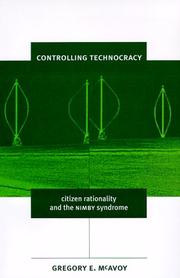| Listing 1 - 10 of 589 | << page >> |
Sort by
|
Image
Year: 2010 Publisher: Golden, Colo. : National Renewable Energy Laboratory,
Abstract | Keywords | Export | Availability | Bookmark
 Loading...
Loading...Choose an application
- Reference Manager
- EndNote
- RefWorks (Direct export to RefWorks)
Book
Year: 2015 Publisher: New York, New York ; Oxford, England : Berghahn Books,
Abstract | Keywords | Export | Availability | Bookmark
 Loading...
Loading...Choose an application
- Reference Manager
- EndNote
- RefWorks (Direct export to RefWorks)
NIMBY (Not In My Back Yard) protests are often criticized as parochial and short-lived, generating no lasting influence on broader processes related to environmental politics. This volume offers a different perspective. Drawing on cases from around the globe, it demonstrates that NIMBY protests, although always arising from a local concern in a particular community, often result in broader political, social, and technological change. Chapters include cases from Europe, North America, and Asia, engaging with the full political spectrum from established democracies to non-democratic countries. Regardless of political setting, NIMBY movements can have a positive and proactive role in generating innovative solutions to local as well as transnational environmental issues. Furthermore, those solutions are now serving as models for communities and countries around the world.
Environmentalism --- Environmental protection --- NIMBY syndrome --- Protest movements

ISBN: 1560002190 Year: 1998 Publisher: New Brunswick Transaction
Abstract | Keywords | Export | Availability | Bookmark
 Loading...
Loading...Choose an application
- Reference Manager
- EndNote
- RefWorks (Direct export to RefWorks)
Land use --- NIMBY syndrome --- Environmental aspects --- Planning --- Citizen participation
Multi
ISBN: 9781782386025 Year: 2015 Publisher: New York, New York ; Oxford, England : Berghahn Books,
Abstract | Keywords | Export | Availability | Bookmark
 Loading...
Loading...Choose an application
- Reference Manager
- EndNote
- RefWorks (Direct export to RefWorks)
NIMBY (Not In My Back Yard) protests are often criticized as parochial and short-lived, generating no lasting influence on broader processes related to environmental politics. This volume offers a different perspective. Drawing on cases from around the globe, it demonstrates that NIMBY protests, although always arising from a local concern in a particular community, often result in broader political, social, and technological change. Chapters include cases from Europe, North America, and Asia, engaging with the full political spectrum from established democracies to non-democratic countries. Regardless of political setting, NIMBY movements can have a positive and proactive role in generating innovative solutions to local as well as transnational environmental issues. Furthermore, those solutions are now serving as models for communities and countries around the world.
Political sociology --- Politics --- Environmentalism --- Environmental protection --- NIMBY syndrome --- Protest movements

ISBN: 0878407413 Year: 1999 Publisher: Washington (D.C.) Georgetown university press
Abstract | Keywords | Export | Availability | Bookmark
 Loading...
Loading...Choose an application
- Reference Manager
- EndNote
- RefWorks (Direct export to RefWorks)
Land use --- NIMBY syndrome --- Science and state --- Technology and state --- Government policy --- Citizen participation

ISBN: 2738493157 9782738493156 Year: 2000 Publisher: Paris : L'Harmattan,
Abstract | Keywords | Export | Availability | Bookmark
 Loading...
Loading...Choose an application
- Reference Manager
- EndNote
- RefWorks (Direct export to RefWorks)
Highway planning --- Political participation --- Transportation and state --- Routes --- Participation politique --- Transport --- Citizen participation --- Planification --- Participation des citoyens --- Politique gouvernementale --- Roads --- NIMBY syndrome --- Location --- Roads - Location - France - Lyon Region --- Roads - Location - France - Lyon Region - Citizen participation --- NIMBY syndrome - France
Book
ISBN: 9781782386018 1782386017 Year: 2015 Publisher: New York : Berghahn Books,
Abstract | Keywords | Export | Availability | Bookmark
 Loading...
Loading...Choose an application
- Reference Manager
- EndNote
- RefWorks (Direct export to RefWorks)
Environmental protection. --- Environmentalism. --- NIMBY syndrome. --- Protest movements. --- Environmentalism --- Environmental protection --- NIMBY syndrome --- Protest movements --- Environnementalisme --- Environnement --- Syndrome PDMC --- Contestation --- Case studies. --- Case studies --- Case studies --- Case studies --- Etudes de cas --- Protection --- Etudes de cas --- Etudes de cas --- Etudes de cas
Periodical
ISSN: 23854405 Year: 2002 Publisher: Barcelona : Generalitat de Catalunya, Departament de Política Territorial i Obres Públiques
Abstract | Keywords | Export | Availability | Bookmark
 Loading...
Loading...Choose an application
- Reference Manager
- EndNote
- RefWorks (Direct export to RefWorks)
Land use --- Planning --- Land --- Land utilization --- Use of land --- Utilization of land --- Economics --- Land cover --- Landscape assessment --- NIMBY syndrome
Book
ISBN: 9264273395 9264273387 Year: 2017 Publisher: Paris, [France] : OECD Publishing,
Abstract | Keywords | Export | Availability | Bookmark
 Loading...
Loading...Choose an application
- Reference Manager
- EndNote
- RefWorks (Direct export to RefWorks)
Land use --- Planning. --- Land --- Land utilization --- Use of land --- Utilization of land --- Economics --- Land cover --- Landscape assessment --- NIMBY syndrome
Book
ISBN: 146480981X 1464809801 Year: 2017 Publisher: Washington, D.C. : The World Bank,
Abstract | Keywords | Export | Availability | Bookmark
 Loading...
Loading...Choose an application
- Reference Manager
- EndNote
- RefWorks (Direct export to RefWorks)
Expansion and development of urban areas require acquisition of land, which, in turn, often requires physical relocation of people who own or occupy this land. Land acquisition and resettlement may also be required to improve the lives of the more than 1 billion people who currently live in slums around the world, most of them in developing countries. Therefore, any effort to embark on significant, sustainable urban development needs to ensure that there are adequate processes for land acquisition and, so that resettlement does not become a constraint to much needed urban development. Planners, policy makers and social scientists can try to implement urban development programs in a way that make people who lose their land, houses or livelihoods become equal partners in the development process. The combination of the high price of urban land, presence of creative individuals in close proximity in urban areas, and the ability of urban space to generate innovative solutions, can help convert urban resettlement into a development opportunity for all. The report illustrates how urban resettlement can become a development opportunity. The Mumbai example shows how the private sector can play a key role, to unleash the potential created by high-value land to provide sustainable housing solutions to those adversely affected, at no cost to the government or the resettlers. Examples from Morocco and Pakistan show how well designed and implemented, citizen-driven resettlement can result in enhanced skills and livelihoods, and can promote overall sustainable urban development. The Mauritania example demonstrates how collective approaches with strong community participation can help address difficult challenges related to housing. The Brazil case shows how resettlement practices with demonstrated, strongly positive outcomes and contributions to urban development can influence governments to incorporate them into their own laws and regulations, helping millions of affected people to benefit from them.
Land use. --- Land use --- Land --- Land utilization --- Use of land --- Utilization of land --- Economics --- Land cover --- Landscape assessment --- NIMBY syndrome
| Listing 1 - 10 of 589 | << page >> |
Sort by
|

 Search
Search Feedback
Feedback About UniCat
About UniCat  Help
Help News
News